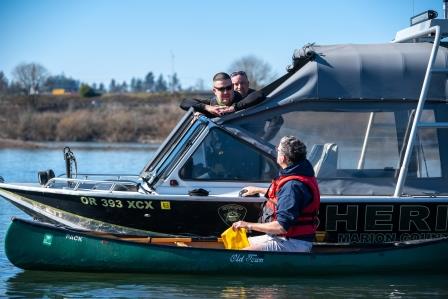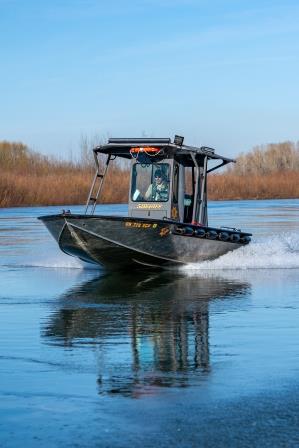The agency contracts with most county sheriff's offices and the Oregon State Police for on-the-water marine patrol services. In waters where the federal government shares jurisdiction, the U.S. Coast Guard also has a presence.
Forty-three percent of your
boating dollars go to marine law enforcement contracts.
Funding includes:
- cost-sharing for enforcement boats and equipment,
- marine training for boat handling and enforcing marine laws
- special emphasis patrols to address localized boating safety issues
- BUII enforcement
- compliance with laws for:
- carriage requirements,
- registration or waterway access permits,
- local area rules for boat operation
- safety intervention (reckless boating, unsafe speed, etc.)
Marine officers are also assisting facility managers in wildfire-impacted areas.
In cases of a serious boat accident, the Marine Board has specially trained officers (Boat Accident Investigation Team) who conduct a comprehensive, forensic reconstruction.
Marine law enforcement partners also talk to boaters about safety. They're also there when boaters are in need. They evaluate and may clear waterway obstructions that are an "extraordinary hazard to navigation." If the obstruction requires professional help, they help find a local contractor the agency can hire. Some of the county programs have certified divers, swift water, and search and rescue teams.
Law enforcement does a lot for boaters:
- Post boating safety signage at boat ramps
- Replace and re-anchor informational/regulatory buoys
- Proctor boating safety equivalency exams,
- Go to local area schools and events to teach boating and water safety.
- Marine patrols also host events or schedule boat inspections.
They will also provide helpful local safety information.
 Courtesy Boat Examinations and Contacts
Courtesy Boat Examinations and Contacts
A boat that meets the regulatory and carriage/equipment requirements is issued a Marine Board "Law Enforcement Decal." This includes paddlecraft and compliance with the waterway access permit and carriage requirements.
Marine patrol officers can also perform Hull Identification Number (HIN) inspections for boat titles and registrations. For both HIN and courtesy boat inspections, contact your local county sheriff's office to schedule (phone numbers below).
Blue Light Law
See a blue, flashing light? If you are approached by a law enforcement boat with blue lights flashing and/or its siren, you must slow to the slowest speed you can safely steer your boat. You may proceed unless otherwise directed by the law enforcement officer. If you approach a law enforcement boat that is not underway with its blue lights on, keep a 200-foot, slow no-wake speed. Slow immediately to the slowest speed to maintain steering. Alter your course so that you do not interfere with or inhibit the operation of the law enforcement boat. You may increase speed only when you're out of the vicinity of the law enforcement boat.
So, show a marine officer some gratitude. The amount of skill, training, and functions they perform is huge. Be courteous and respectful. Help do your part; obey the laws and boat safe!